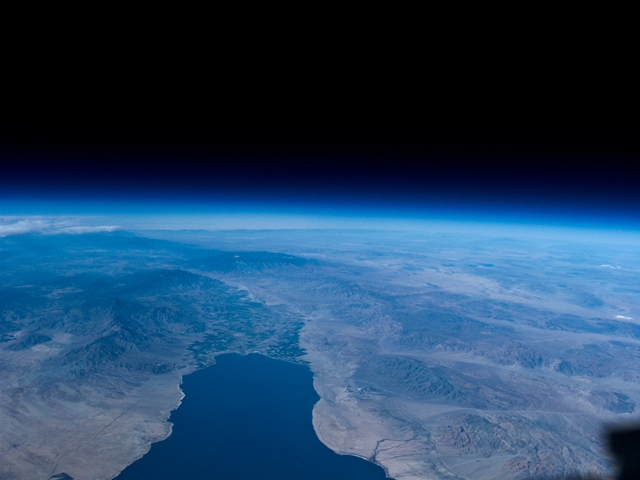Local entrepreneur Jason Krueger helps students send science experiments to the edge of space
By Dan Domsic
A helium balloon bursts, and its cargo falls to earth, tumbling through the jet stream.
The precious cargo falling to earth is just one science experiment for one group of students working with StratoStar, a company that provided the kit that made it possible.
“We don’t exactly know what’s going to happen,” Jason Krueger, founder and president said. “It’s always an adventure, and we’re using that adventure and science and math with this activity to inspire students.”
Krueger collaborates with schools and universities around the country to give students an opportunity for hands-on experience outside of the classroom, aiming to re-arm curiosity and bolster interest in the science, technology, engineering and mathematics fields.
College, high school, junior high school, and even elementary school students, launch experiments about 100,000 feet into Earth’s atmosphere – the edge of space.
A few dreams get launched along the way.
Lessons from a Cold Warrior
StratoStar launched from classroom activities at Taylor University, where Krueger studied, graduating in 2006.
One professor, Dr. Hank Voss, worked at a division of Lockheed Martin during the Cold War, and when it was his turn to teach, recognized a lack of real hands-on work for undergraduate students who had plenty of theoretical knowledge.
During a competition with other universities to make a space launch happen, a high altitude weather balloon was employed to test a potential satellite as a cost-effective alternative to subjecting it to a space-simulating chamber.
After the launch and chase for the falling satellite, the professor pitched the idea of getting the project into other schools to Krueger, one of his students who majored in marketing systems.
Krueger started the company during his senior year at Taylor in 2006.
“This is project-based learning at its finest,” Krueger said.
A partnering school designs its own experiments to use with the balloon and kit. The experiments answer questions like: With the right safety measures, can a cockroach survive a flight to space?
Krueger said StratoStar provides all the sensors and equipment, while students come up with the experiments and teachers eye standards and requirements.
Learning Curve
Krueger said the company, which includes two other employees, wants to change the approach to education.
“We want to make education hands-on, exciting, and really unlock that curiosity,” Krueger said. “It’s the same curiosity you see in young students that maybe played with Legos or blocks or something, and it’s there, but for some reason when you get to junior high or high school, some of that Curiosity is gone. We want to bring that back so that we can have this type of people help our country develop and make those next discoveries in science or engineering.”
His own curiosity originally led him down the road of engineering.
“Growing up, I wanted to be an engineer,” he said. “I built things, (and) took things apart my whole life.”
But Krueger went through high school without taking advanced placement courses – leading to a recommendation to get started in community college before heading to the real deal.
Krueger passed on that notion, ready to get his life moving forward, as well as stay on track with a favorite sport – lacrosse.
He picked a type of business degree with the hopes of working for an engineering company.
“I get to do everything I ever wanted to do with this company,” he said.
“Jason is one who is very excited about what he does and the impact he can have on young people and getting them engaged with science and seeing science as something that’s interesting and something they might want to pursue as a career,” Dr. Don Takehara, director of Taylor’s Center for Research and Innovation, said.
Takehara said it’s key for Krueger to have the passion and want to make a difference.
Making a difference is measurable in Krueger’s different experiences.
At one point, Krueger was called in to NASA’s Kennedy Space Center to work with engineers on a project, getting work done without the “red tape” of a rocket launch.
StratoStar’s reach has gone coast to coast, and recently, the Omaha Public Schools system in Nebraska bought enough equipment from the company for “large scale implementation.”
After Purdue University implemented StratoStar, Krueger stumbled onto a student that credited the program for guiding her toward a gig – steering satellites for companies like Sirius Satellite Radio.
He said, “Just knowing that I made an impact on a student that changed her life and that will help our country makes all the difference to me.”



